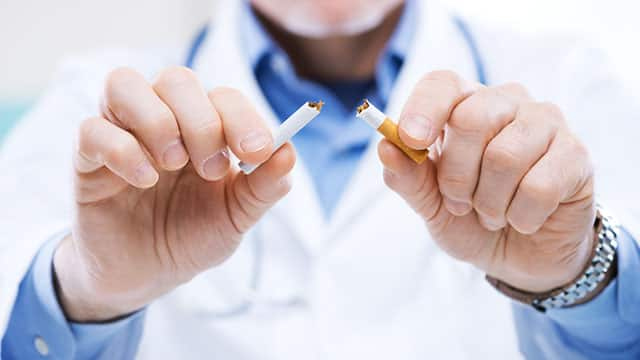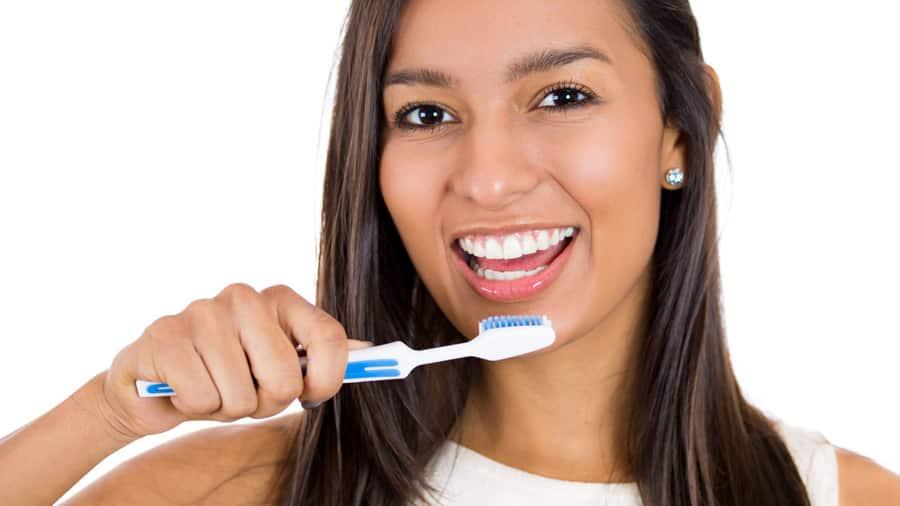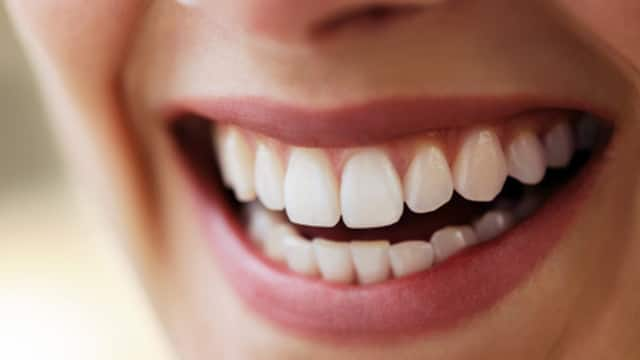Let us delve into understanding the types of stains and the effects of smoking and nicotine on oral health. Besides remedies, the effective measures to prevent such discolouration are worth knowing to help you discover a constant, healthy smile.
Types of Teeth Stains
Teeth colour transformation can be quite subtle and often gradual. Despite an excellent oral care routine, your teeth can become stained, showing noticeable changes with age. The build-up of stains is a contributing factor to yellow teeth. A change in tooth colour can arise from external, internal, or age-related factors, classified as three types of teeth stains. Let us go through them before discovering how to remove stains from teeth.
Extrinsic Stains: Extrinsic tooth stains discolour your enamel, the outer layer of the tooth that protects the underlying soft tooth structure (dentin). Enamel, though the hardest part of the tooth, comes in contact with everything you put in your mouth, be it berries, red wine, or nicotine. Over time, it absorbs some of the colours of the items you consume, causing a stain.
Intrinsic Stains: These stains occur when dentin, the sensitive layer underneath the enamel, is stained. Dentin is naturally darker and more yellow than enamel. It gets exposed when the enamel thins out or erodes from wear and tear or inadequate oral hygiene. Intrinsic stains are more challenging to remove using dental hygiene practices.
Age-Related Stains: It is natural that your body changes as you age. The dentin darkens, and your enamel thins out, exposing the underlying dentin. Together, these factors cause tooth discolouration, which is out of your control - no matter how careful you've been with your oral hygiene.
What Are the Effects of Smoking on Oral Health?
The damaging effects of smoking on health are well known. It can be problematic for almost every organ in the body and lead to several diseases. Research shows that the widespread use of tobacco claims a significant number of lives in India every year. Besides, smoking and tobacco use have adverse effects on one’s oral health, which include teeth discolouration and various dental problems, including gum disease.
Yellow or brown teeth discolouration is often caused by smoking stains on teeth. The chemicals found in cigars, cigarettes, and chewing tobacco are the main culprits behind tooth staining. When smoke particles mix with saliva and adhere to the tooth enamel, they form adamant stains that are tough to remove. The two major compounds responsible for such teeth staining are:
Nicotine: It is a colourless, odourless chemical compound in tobacco leaves that makes you addicted to tobacco products. It is also used as a pesticide to kill insects. As nicotine enters your body through cigarette smoking or tobacco use, it combines with oxygen to turn yellowish and stain your teeth.
Tar: It is a sticky, brown residual substance produced upon burning tobacco or cigarette smoking and causes yellow or brown stains on teeth. Over time, they can become stronger and more resistant to regular brushing and flossing.
Can Nicotine Damage Teeth Beyond Appearance?
Nicotine is a colourless, odourless compound in tobacco leaves and has been used in insecticides for centuries. As it enters the body through tobacco or cigarettes, it puts you at significant risk of numerous systemic and oral diseases. It affects internal organs, including the heart, lungs, kidneys, and reproductive system. Various studies have also noted its carcinogenic potential.
The adverse effects of nicotine on oral health go beyond leaving you with tobacco-stained teeth. It weakens the body’s innate immune system, making you more susceptible to numerous oral problems, such as:
Bad breath
Tooth decay and dental caries
Gum infections and periodontal disease
Potential tooth loss
Increased risk of oral cancer
Remedies to Remove Smoking Stains From Teeth
If you smoke and have noticed bad breath, decreased taste, or teeth stains, you may be searching for ways to treat or reverse these effects. The first and most crucial thing to do for your oral health is to quit smoking. If you have accomplished it and are wondering how to remove smoking stains from teeth, the following are some effective methods to consider:
Dental Cleaning: Regular dental cleanings with a dental hygienist can effectively remove surface stains and tartar buildup that brushing and flossing alone cannot eliminate.
Professional Whitening: Dentists offer teeth whitening procedures, also called in-office whitening, using safe concentrations of whitening or bleaching agents to significantly lighten the tooth stains. For deep and adamant stains, veneers or bonding may be suggested. Veneers are thin shells placed over the teeth, whereas bonding involves applying tooth-coloured resin to cover the stains.
Take-home Whitening Trays: Your dentist may provide you with a take-home whitening tray customised to fit the shape of your mouth. These can be simple application trays or LED trays with a whitening gel designed by a dentist to aid the working of a teeth-whitening pen.
Over-the-counter Products: A dental professional can recommend suitable over-the-counter teeth-whitening products. These include proprietary whitening strips, toothpaste, pens, *teeth whitening serum and foams that lighten stains with regular use at home as directed.
*for temporary efficacy.
*vs brushing with Colgate non whitening toothpaste alone.
Preventive Measures for Long-Term Oral Health
Apart from the various whitening options to remove tobacco stains from teeth, there are several things you can do to reduce stains, care for your gums, and improve oral health. They include:
Quit Smoking: Giving up smoking is the most effective way to prevent further teeth staining and potential dental issues. It is an important step that helps you remove nicotine stains from your teeth and shields you from the potential health problems caused by tobacco use.
Watch Your Diet: Limit foods and beverages that can stain teeth, such as coffee, tea, red wine, and berries. Using a straw while drinking such beverages reduces direct contact with your teeth, helping to avoid staining.
Regular Dental Care: If you have quit smoking already, maintaining good oral hygiene is the next essential step. It includes brushing at least twice daily, flossing once daily, rinsing with mouthwash, and scheduling regular dental check-ups.
You may consider using an antibacterial toothpaste such as Colgate Total Advanced Health to enhance your dental health and defend your whole mouth against harmful bacteria and infections. It is an antibacterial toothpaste that fights germs for 12 hours on teeth, tongue, cheeks, and gums. Unlike ordinary toothpaste, it has Dual Zinc and Arginine technology, actively seeking out bacteria and forming a protective, anti-germ barrier.
Final Thoughts
Quitting smoking can sound challenging. However, weighing its adverse effects, including teeth staining, oral problems, and potential health hazards, will make your effort worthwhile. It is a crucial and commendable resolution to take before considering how to remove smoking stains from teeth. Maintaining proper oral hygiene and regular dental visits can help effectively eliminate smoking stains from your teeth.
Frequently Asked Questions
How to remove smoking stains from teeth?
Nicotine stains from prolonged smoking or tobacco use do not go away with brushing and flossing alone. If you are an avid smoker wondering how to remove tobacco stains from teeth, getting professional teeth whitening treatments from a dentist is ideal.
What is the best tooth stain remover?
There is no single "best" teeth stain remover, as it depends on the severity of the stain. Over-the-counter products, such as a whitening toothpaste with gentle abrasives, can help remove mild stains. For stubborn stains, professional whitening treatments from a dentist may be necessary. It is always ideal to consult a dentist to find what works best for you.
How to remove stains from teeth?
Mild stains go away with regular flossing and brushing using a proprietary whitening toothpaste. However, smoking stains on teeth from the nicotine content of cigarettes and tobacco are stubborn and challenging. Professional teeth whitening treatments from a dentist may be necessary to remove tobacco stains from teeth.
What is a home remedy for removing stains from teeth?
Various DIY teeth-cleaning remedies using products at home, such as baking soda or hydrogen peroxide, may lack adequate scientific evidence and can have potential side effects. Regular brushing using whitening toothpaste and flossing helps remove surface stains, though they do not brighten tobacco-stained teeth. Teeth whitening treatment from a dentist is a safe and effective alternative to a tobacco-stained teeth home remedy.
This article is intended to promote understanding of and knowledge about general oral health topics. It is not intended to be a substitute for professional advice, diagnosis or treatment. Always seek the advice of your dentist or other qualified healthcare provider with any questions you may have regarding a medical condition or treatment.
ORAL HEALTH QUIZ
What's behind your smile?
Take our Oral Health assessment to get the most from your oral care routine
ORAL HEALTH QUIZ
What's behind your smile?
Take our Oral Health assessment to get the most from your oral care routine













